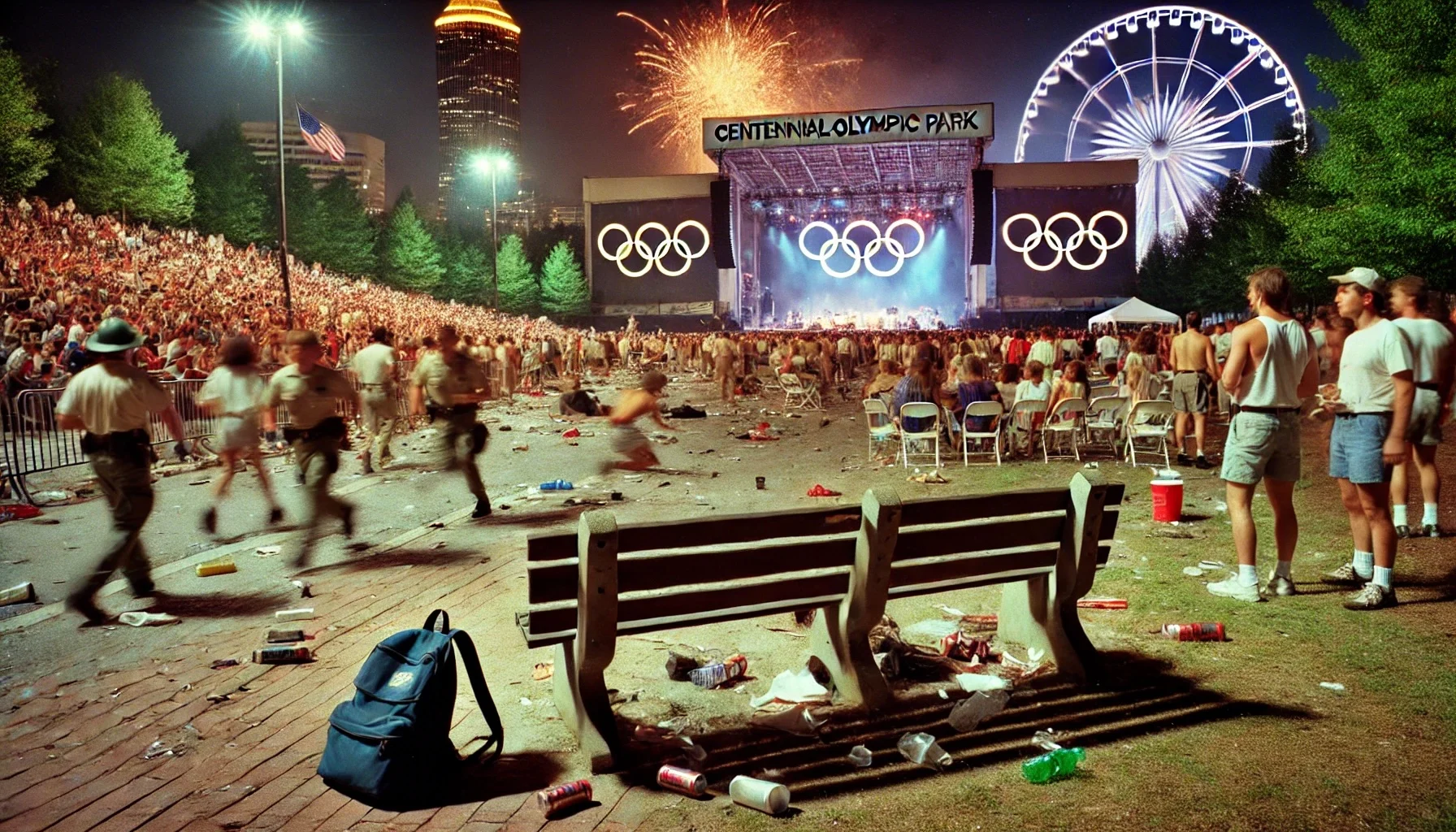
The Atlanta 1996 Centennial Olympic Park Bombing
by: The Calamity Calendar Team
July 27, 1996
The Centennial Olympic Park was designed to be the heart of the 1996 Summer Olympics in Atlanta, Georgia. This bustling park was filled with athletes and visitors from around the globe, enjoying concerts and soaking in the Olympic spirit. However, as the clock struck 12:58 a.m. on July 27, 1996, a seemingly normal night took a dark turn.
Discovery of a Deadly Threat
Security guard Richard Jewell was on duty that night, keeping a watchful eye over the throngs of people. As he patrolled the park, something caught his attention—a suspicious backpack tucked under a bench. Jewell’s instincts kicked in, and he immediately alerted officers from the Georgia Bureau of Investigation. The backpack, it turned out, was far from ordinary.
A Warning Call and a Race Against Time
Minutes after Jewell’s discovery, at 1:07 a.m., a chilling 911 call was made. The caller’s voice was calm yet menacing as he warned, “There is a bomb in Centennial Park. You have thirty minutes.” Panic spread as law enforcement and emergency responders scrambled to evacuate the area. Every second was precious, and the clock was ticking.
The Explosion
Thanks for subscribing!
Despite their efforts, time ran out. At 1:20 a.m., the bomb detonated. The peaceful night was shattered by a thunderous explosion that sent shrapnel tearing through the crowd. In an instant, chaos reigned. People screamed, running in all directions, as emergency responders rushed to the scene, their faces set with grim determination.
The Immediate Aftermath
The bombing claimed the life of Alice Hawthorne, a 44-year-old mother there to enjoy the festivities, and caused another death from a heart attack. Over 100 others were injured, some critically. The beautiful park, a symbol of international unity and peace, was left scarred by the violence.
A Community and a Nation Respond
The response was immediate and overwhelming. Law enforcement agencies, including the FBI and the Bureau of Alcohol, Tobacco, Firearms and Explosives (ATF), launched one of the largest investigations in U.S. history. Security measures were drastically heightened across all Olympic venues, and a wave of fear rippled through the Olympic community.
Richard Jewell: From Hero to Suspect
In the chaotic days following the bombing, Richard Jewell, who had initially been hailed as a hero for spotting the bomb, found himself under suspicion. The FBI’s focus shifted to Jewell, and the media frenzy that followed turned his life upside down. For months, Jewell lived under a cloud of suspicion, his every move scrutinized.
The Real Bomber
The true perpetrator, however, remained at large. Eric Robert Rudolph, a man driven by extremist ideologies, was eventually identified as the bomber. Rudolph was responsible for this attack and three others targeting abortion clinics and a lesbian nightclub. After years on the run, he was finally captured in 2003.
Justice and Reflection
In 2005, Rudolph was sentenced to life imprisonment without the possibility of parole. His capture and confession brought a measure of closure to a deeply scarred community. For Richard Jewell, exoneration came too late to erase the ordeal he had endured, but he eventually received settlements from several news organizations that had prematurely implicated him.
Legacy of the Bombing
The Centennial Olympic Park bombing remains a somber reminder of the vulnerabilities that exist even at the heart of celebration and unity. The event prompted a reevaluation of security procedures for large public gatherings, leading to enhanced screening and surveillance measures that are now standard practice.
In the annals of history, the bombing stands as a testament to both the darkness that can strike unexpectedly and the resilience of communities in the face of such threats. It underscores the importance of vigilance and the need for justice, as well as the profound impacts of wrongful accusations.
Even today, the lessons learned from that tragic night continue to shape how we protect and cherish our shared spaces, ensuring that the spirit of unity and peace can prevail over the forces that seek to undermine it.
Stay in the Loop!
Become a Calamity Insider and get exclusive Calamity Calendar updates delivered straight to your inbox.
Thanks! You're now subscribed.